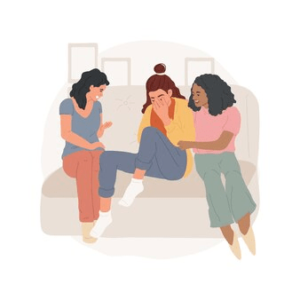
Losing friends can be a natural part of life’s changing dynamics. It occurs when connections between individuals weaken or fade away due to various reasons such as relocation, differing interests, or evolving priorities. Sometimes, misunderstandings or conflicts may also contribute to the loss of friendships. Regardless of the cause, losing friends can evoke feelings of sadness, loneliness, or even relief, depending on the circumstances. It’s important to acknowledge and process these emotions while also recognizing that new opportunities for connection and growth may arise.
What is the psychology of losing friends?
The psychology of losing friends involves various emotional and cognitive processes. When individuals experience the loss of friendships, it can trigger feelings of sadness, loneliness, and rejection. These emotions stem from attachment bonds formed with friends, where the loss disrupts the sense of connection and support. Additionally, losing friends may impact self-esteem and self-perception, leading to feelings of inadequacy or unworthiness. From a cognitive perspective, individuals may ruminate on the reasons for the friendship ending, replaying past interactions, or perceived mistakes.
What Are the Risks of Losing Friends When You Have Depression?
If you’re experiencing the loss of friends while coping with depression, consider seeking support from professional therapists or “Online counselor”.
- Increased Isolation: Losing friends can lead to heightened feelings of loneliness and isolation, worsening depressive symptoms.
- Lack of Support: Friend estrangement means losing a crucial support system, making it harder to cope with the challenges of depression.
- Reduced Social Interaction: Loss of friends may result in decreased social interaction, which can negatively impact mood and mental well-being.
- Loss of Understanding: Friends may not understand or empathize with the struggles of depression, leading to feelings of alienation and loneliness.
- Negative Self-Perception: Losing friends can contribute to negative self-perception and feelings of worthlessness, intensifying depressive symptoms.
- Decreased Confidence: Loss of friendships can diminish self-confidence and self-esteem, making it more difficult to seek help or engage in social activities.
- Limited Coping Strategies: Friend disconnection may limit access to coping strategies such as talking to someone or engaging in enjoyable activities, exacerbating feelings of hopelessness.
- Increased Stress: Friend estrangement can heighten stress levels, further worsening symptoms of depression and anxiety.
- Loss of Identity: Friends often play a role in shaping one’s identity and sense of belonging, and losing them can lead to a loss of identity and purpose.
- Withdrawal from Activities: Friend detachment may result in withdrawing from social activities and hobbies, leading to further isolation and a lack of fulfillment.
- Risk of Substance Abuse: Loss of friends can increase the risk of turning to substance abuse as a coping mechanism for dealing with depression and loneliness.
- Impact on Relationships: Friend disconnection can strain existing relationships and make it difficult to form new connections, further exacerbating social isolation.
- Negative Impact on Physical Health: Social isolation resulting from losing friends can negatively affect physical health, including weakened immune function and increased risk of chronic illnesses.
- Impaired Functioning: Loss of friendships can impair daily functioning and decrease motivation to engage in self-care activities, intensifying depressive symptoms.
- Difficulty Seeking Help: Losing friends may make it harder to reach out for help or seek professional support for depression, or inadequate treatment.
Some friendships may grow stronger and more supportive during difficult times.
How to Cope with Losing Friends When You Have Depression?
Coping with losing friends while experiencing depression can be difficult, but there are strategies to help navigate this challenging situation, including seeking “Therapy near me”.
- Acknowledge Your Feelings: Recognize and accept your emotions surrounding the loss of friendships, allowing yourself to grieve and process the situation.
- Seek Professional Help: Consider reaching out to a therapist or counselor who can provide support and guidance in navigating feelings of loss and depression.
- Lean on Supportive Relationships: Focus on maintaining connections with supportive friends, family members, or support groups who can offer understanding and encouragement.
- Engage in Self-Care: Prioritize self-care activities such as exercise, healthy eating, adequate sleep, and relaxation techniques to support your overall well-being.
- Express Yourself: Find healthy outlets to express your emotions, such as journaling, creative arts, or talking with a trusted confidant.
- Set Boundaries: Establish boundaries with toxic or unsupportive individuals, prioritizing your mental health and well-being above maintaining unhealthy relationships.
- Practice Mindfulness: Incorporate mindfulness and meditation techniques into your daily routine to help manage stress and promote emotional resilience.
- Focus on Personal Growth: Use this time of transition to focus on personal growth and self-discovery, exploring new hobbies, interests, or goals.
- Stay Connected: Stay connected with others through social activities, volunteering, or joining clubs or organizations where you can meet like-minded individuals.
- Challenge Negative Thoughts: Challenge negative thoughts and beliefs about yourself or your worthiness of friendship, replacing them with more realistic and compassionate perspectives.
- Set Realistic Expectations: Be gentle with yourself and set realistic expectations for your recovery process, understanding that healing takes time and patience.
- Investigate Professional Support Groups:– Take into consideration becoming a member of a support group that offers opportunities for mutual support and sharing experiences for those dealing with depression or loss.
- Practice Gratitude: Cultivate a sense of gratitude by focusing on the positive aspects of your life, even amidst difficult circumstances, to foster resilience and perspective.
- Engage in Meaningful Activities: Pursue activities that bring you joy and fulfillment, whether it’s spending time in nature, pursuing creative interests, or helping others in need.
- Celebrate Progress: Acknowledge and celebrate small victories and milestones in your journey towards recognizing your resilience and strength.
In conclusion, the loss of friendships can have significant impacts on individuals, particularly when experienced alongside conditions like depression.

